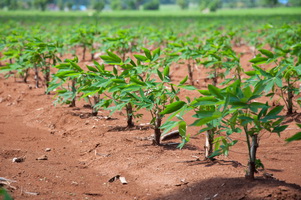
CRISPR-Cas9 Used to Reduce Symptoms of Cassava Brown Streak Disease
August 29, 2018| |
 Cassava Brown Streak Disease (CBSD), which is caused by Cassava brown streak virus and Ugandan brown streak virus, interferes with successful cassava propagation in East and Central Africa. The disease is mediated by the interaction of these viruses with the viral genome-linked protein (VPg) and host eukaryotic translation initiation factor 4E (elF4E) isoforms of cassava.
Cassava Brown Streak Disease (CBSD), which is caused by Cassava brown streak virus and Ugandan brown streak virus, interferes with successful cassava propagation in East and Central Africa. The disease is mediated by the interaction of these viruses with the viral genome-linked protein (VPg) and host eukaryotic translation initiation factor 4E (elF4E) isoforms of cassava. Scientist Michael Gomez from the University of California, Berkeley and colleagues aim to contribute in alleviating this problem by targeting novel cap-binding proteins (nCBP-1 and nCBP-2) for CRISPR-Cas9-mediated editing. These proteins are among the elF4E isoforms involved in the onset of CBSD.
They observed delayed and attenuated CBSD aerial symptoms and reduced severity and incidence of root necrosis, which is one of CBSV infection symptoms, in the CRISPR mutants. CRISPR-Cas9 proved to be an effective tool in promoting disease tolerance in cassava. The researchers aim to study the effect of other remaining elF4E isoforms on CBSD to further design a cassava disease tolerance strategy.
For more information, read the article in Plant Biotechnology Journal.
| |
Biotech Updates is a weekly newsletter of ISAAA, a not-for-profit organization. It is distributed for free to over 22,000 subscribers worldwide to inform them about the key developments in biosciences, especially in biotechnology. Your support will help us in our mission to feed the world with knowledge. You can help by donating as little as $10.
-
See more articles:
-
News from Around the World
- AfDB and FAO Boost Join Efforts to End Hunger and Create Wealth in Africa
- Purdue Researchers Discover Key to Mass Producing Beneficial Plant Compounds
- Researchers Unlock Secrets of Plant Development
- Argentina to Release First Biotech Soybean from China
- Farmers in South America Reap Significant Benefits from Planting Biotech Soybeans
- APHIS Announces Deregulation of GE Canola
- Researchers Discover Proteins Allow Plants to Rest Photosynthetic Activity at Night
- Japan's Ministry of Environment Meets to Discuss Genome Editing Regulation
- Scientists Isolate First Major Resistance Genes Against Wheat Stripe Rust Disease
- Global Biotech Crop Adoption Report Launched in Bogor, Indonesia
- Plant Leaves Possess A Molecular Compass
-
Research Highlights
- Scientists Identify Maize QTLs for Simultaneous Root and Agronomic Trait Selection
-
Beyond Crop Biotech
- Scientists Use Environmental DNA Approach for Agri Pest Surveillance
- Most Americans Accept GE Animals for Human Health, Study
-
Resources
- Guide to Understanding CRISPR Data Analysis Scores
-
Plant
- CRISPR-Cas9 Mediates Targeted Gene Replacement and Knockin in Arabidopsis
- Genome Editing to Control Gene Expression in Plants
- CRISPR-Cas9 Used to Reduce Symptoms of Cassava Brown Streak Disease
-
Read the latest: - Biotech Updates (November 26, 2025)
- Gene Editing Supplement (November 26, 2025)
- Gene Drive Supplement (February 22, 2023)
-
Subscribe to BU: - Share
- Tweet
